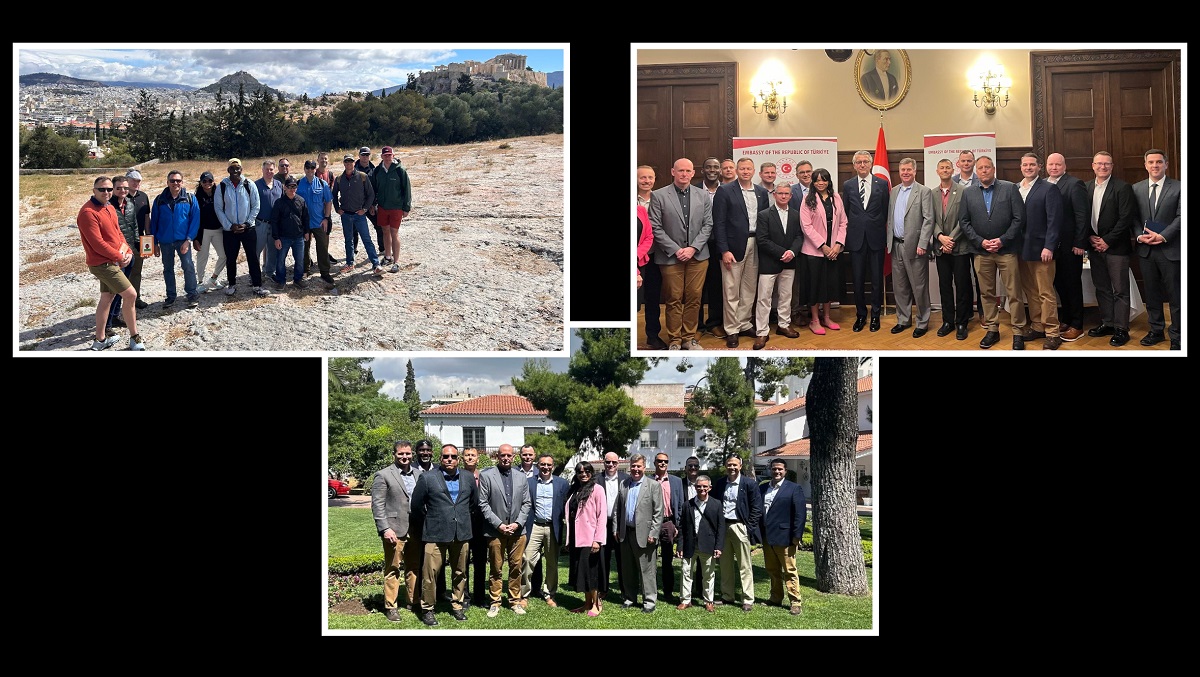
This week, we have one final episode in our “Back to School” series highlighting another special program at the U.S. Army War College. The Advanced Regional Studies (ARS) program offers opportunities for students to meet the senior decision- and policy-makers of our allied and partner nations on their own turf. Daniel Krebs, the director of ARS, is in the studio to explain how a select number of students will travel abroad for study. He joins podcast editor Ron Granieri to discuss how students gain invaluable knowledge and understanding of the culture and mindset of these nations and their leaders by spending time in their countries and meeting with them face-to-face.
For more information about the Advanced Regional Studies program you can contact the director, Dr. Daniel Krebs daniel.krebs@armywarcollege.edu.
I think it is valuable that we not just have Foreign Area Officers, that we have more people in the force that have some deeper knowledge, understanding, strategic empathy and knowledge of strategic culture, the environment in the region…that sit at COCOMs that go to higher staff…and can be better advisers and ultimately better decision makers.
Podcast: Download
Daniel Krebs is an Associate Professor of Security Studies and Director of the Advanced Regional Studies Program in the Department of National Security and Strategy at the U.S. Army War College. He previously taught at the University of Louisville, Ky. His teaching and research focus on military history, strategy, theories of war, and European security and defense policies.
Ron Granieri is Professor of History and the Chair of the Department of National Security and Strategy at the U.S. Army War College and the Editor of A BETTER PEACE.
The views expressed in this presentation are those of the speakers and do not necessarily reflect those of the U.S. Army War College, U.S. Army, or Department of Defense.
Photo Description: Clockwise from top left – AY24 Advanced Regional Studies students visiting Pnyx Hill, site of public debate in ancient Athens; engaging with Turkish Ambassador to Greece at the Turkish Embassy; at the U.S. Ambassador’s Residence, Athens.
Photo Credit: Courtesy of Dr. Michael Neiberg





Conflict today — whether we are talking about the “war on terror” conflict with the U.S./the West today, the “great power competition” conflict with the U.S./the West today, lesser state conflicts with the U.S./the West today and even the internal conflict occurring within the U.S./the West itself today — ALL of these such conflicts would seem to have a common aspect; this being, that these are conflicts with entities who (a) do not wish to be transformed more along ultra-modern/ultra-contemporary U.S./Western political, economic, social and/or value lines (they fear losing/have already lost power, influence, control, status, privilege, prestige, safety, security, etc., under these such arrangements) and, thus, who (b) are willing to use whatever means are available to them; this, to prevent these/to prevent further such unwanted and threatening transformations.
Given that the above would seem to encompass many/most of the important conflicts that the U.S./the West is involved in today, then might those who are allowed to visit various regions in the Advanced Regional Studies Program, might these folks (and their faculty supervisors?) wish to (a) ask questions of various diplomats, military leaders, government employees, etc., as to these such specific matters and, then, (b) compare notes later — as to the answers they receive — from the various regions that they were privileged to visit?
How might I preface such questions? As follows:
a. The positive relationships — both here at home and there abroad — between populations and their elites, between populations and their governments and between populations and their militaries — that were developed during the Old Cold War when (a) the Soviets/the communists were doing “transformation” (and, thus, posed the gravest threat to traditional social values, beliefs and institutions back then) and when (b) the U.S./the West, back then, could say that we opposed same. Note that:
b. These such positive relationships should not have been expected to endure; this when, post-the Old Cold War, the U.S./the West became the one’s seeking to do “transformation” (and, thus, came to pose the gravest threat to traditional social values, beliefs and institutions) and when (b) such nations as Russia and China could say that they opposed same. (This being, thus, why the rationale of “The End of History” fails?)
Thus, the questions that I might pose, these would fall within the New/Reverse Cold War context/perspective that I provide above.
Note that — from the New/Reverse Cold War perspective that I provide above — such things as “regional studies,” these would seem to be very important indeed, for example, so as to be able to continually gauge — in the various regions of the world —
a. Who is supporting the U.S./the West’s (and our partner and allied governments’) “transformative”/”development”/”modernization” missions. (And track the possible changing degree of this such support.) These such “support” personnel, generally speaking, being the more progressive elements of the world’s states and societies — and/or — those who believe that they will GAIN and/or RETAIN power, influence, control, etc., via such support?
And to be able to continually gauge — in the various regions of the world —
b. Who is threatened — and thus who will stand hard against — the U.S./the West’s (and our partner and allied governments’) “transformative”/”development”/”modernization” missions. (And track the possible changing degree of this such “resistance.”) These such “stand hard against” personnel, generally speaking, being the more conservative elements of the world’s states and societies — and/or — those who believe that they will LOSE power, influence, control, etc., via the U.S./the West’s such “pro-change” initiatives. (These such “stand hard against” folks also understanding that they can actually GAIN power, influence, control, followers, etc.; this, by claiming that they are the champions/the leaders/the protectors of the such things as traditional social values, beliefs and institutions?)
Regarding the seeming exceptional relevance and importance of the U.S. Army War College’s regional studies program — and advance regional studies program — is the above New/Reverse Cold War perspective helpful?
A possible complementary argument:
While it certainly would seem important and useful to study the various cultures, histories, traditions, etc., of the various regions of the world today, it would seem to be oh so much more important and useful to study these matters from a very specific and particular perspective, for example, from the perspective of why these such cultures, histories, traditions, etc. — of the various states and societies of the world (to include our own?) — are being universally “weaponized” and universally used against U.S./Western governments today.
As to this such “why” question, might we say that the reason why aspects of various cultures, histories, traditions, etc., are now being universally “weaponized” and universally used against U.S./Western governments today, this is because these such means/methods/ways have proven to be effective (for example, in the Old Cold War, versus the Soviets/the communists back then; and in the New/Reverse Cold War, versus the U.S./the West today) as a means/method/way to thwart the efforts of those who seek to achieve unwanted and threatening political, economic, social and/or value change — both in their home countries and abroad.
Thus, a suggestion to connect/better connect such things as “regional studies” — and “advanced regional studies” — these, to (a) the “transformative” political objective and related efforts made by the U.S./the West post-the Old Cold War and still today and to (b) the culture, history and traditions “fight back” efforts being made by the various states, societies and groups of the world (to include those in our own country) today.
As to my thoughts immediately above — re: why aspects of the cultures, histories, traditions of the various states and societies of the world (to include our own?) are being universally “weaponized” and universally used against U.S./Western governments today — as to those such thoughts, perhaps an example from China would prove useful.
In this regard, consider the following excerpts from the Foreign Policy paper “What it Means to Be ‘Liberal’ or ‘Conservative’ in China: Putting the Country’s Most Significant Political Divide in Context” by Taisu Zhang. (Note: Items in parenthesis below are mine.):
“Whatever one thinks of this position, there is probably some truth to the claim that the Chinese intellectual world of the 1980s and 1990s was both predominantly liberal (i.e., more likely to support constitutional democracy, human rights, and free market reforms) on political and economic issues and distinctly hostile to traditional culture (in this China case, think Confucianism and Chinese socialism). The enormously influential documentary series River Elegy, which combined express attacks on Confucianism with thinly veiled criticisms of the party-state apparatus, is but one example of this. Chinese liberalism was indeed often critical of traditional family structures, social hierarchies, and what it perceived as backwards elements of Confucian political and economic thought. In the intellectual world, at least, Chinese cultural conservatism (Confucianism) and leftism (Chinese socialism) did share two important commonalities: Both were minority positions facing a perceived liberal majority, and both encountered significant hostility from this perceived majority.
This may, in fact, be the missing explanatory element. Ideologies regularly define themselves against a perceived ‘other’ and in this case there was quite plausibly a common and powerful ‘other’ that both cultural conservatism and political leftism defined themselves against. This also explains why leftists have, since the 1990s, become considerably more tolerant, even accepting, of cultural conservatism than they were for virtually the entire 20th century. The need to accumulate additional ideological resources to combat a perceived Western liberal ‘other’ is a powerful one, and it seems perfectly possible that this could have overridden whatever historical antagonism, or even substantive disagreement, existed between the two positions.”
As we can see from the above:
a. Post-the Old Cold War, in China (and indeed elsewhere throughout the world and even here at home in the U.S./the West?), aspects of “traditional culture” came under severe attack by Western government sponsored “liberalism.” Thus,
b. Post-the Old Cold War, in China (and indeed elsewhere throughout the world and even here at home in the U.S./the West?) those who derived their power, influence, control, status, prestige, privilege, safety, security, etc., from “traditional culture” (and, thus, were existentially threatened by assaults by liberalism on same), these folks saw the need to find a way to fight back (for example, by modifying and “weaponizing” their traditional cultures?).
Bottom Line Question — Based on the Above:
Accordingly, does the above not qualify as one of the dominant — if not THE dominant — matter that “regional studies” programs — and “advanced regional studies” programs — should focus on today?